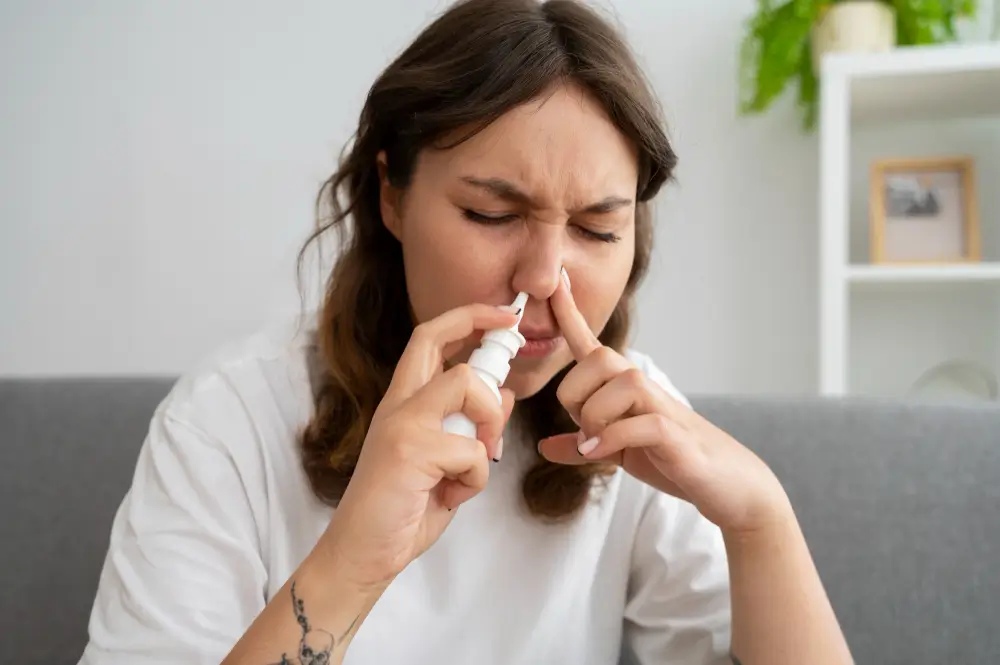Effective Ways to Treat a Dry Nose and Soothe Your Skin
What if that constant nose itch or burning sensation wasn’t just an inconvenience—but a sign your skin is asking for help? Dry nasal passages and dry nostril pain can sneak up with subtle symptoms, then linger longer than expected. In Effective Ways to Treat a Dry Nose and Soothe Your Skin, discover what your nose is trying to tell you—and how to finally bring it relief.
TL;DR
Dry nose and skin discomfort can result from environmental conditions, prolonged mask use, medications, or dehydration. Simple strategies like using a cool-mist humidifier, applying gentle saline sprays, hydrating regularly, and incorporating natural oils (like olive or sesame) can restore moisture and soothe irritation. Avoid hot water, harsh products, and extreme weather by using hypoallergenic skincare and wearing breathable fabrics to support nasal and skin health.
Looking for the best primary care physician Brooklyn? Find out more.

Why Does Your Nose Get Dry and How Can You Treat It?
Nasal dryness is a common issue that can affect people of all ages, especially in environments with low humidity or when exposed to air conditioning and heating for extended periods.
Though it might seem minor, a dry nose affects your ability to filter, humidify, and warm incoming air—making you more vulnerable to viruses, bacteria, and airborne irritants.
Common causes of nasal dryness include:
- Dry air or extreme temperatures: Both heat and cold reduce moisture in the nasal mucosa.
- Air conditioning or heating: These systems can dry out indoor environments, irritating nasal tissues.
- Pollution or smoke exposure: Tobacco smoke, pool chlorine, and air pollution can irritate your nose.
- Prolonged mask use: Extended use, especially in professional settings, contributes to dryness.
- Conditions like rhinitis, allergies, or viral infections: These can trigger or worsen nasal dryness.
- Certain medications: Including antihistamines, decongestants, and cancer treatments.
Extra tips:
- Drink at least 2 liters of water daily.
- Eat hydrating fruits and vegetables.
- Maintain indoor humidity between 45% and 65% at 20°C.
- Avoid stifling sneezes—use a tissue instead.
- Blow your nose gently, one side at a time.
- Wash your hands after touching or cleaning your nose.
Hydration, gentle care, and appropriate products can relieve discomfort and support daily respiratory health.
Use a Humidifier to Add Moisture to the Air
Maintaining proper humidity indoors can make a big difference in relieving nasal dryness. One of the easiest and most effective ways is by using a humidifier.
A humidifier increases moisture in the air, which is helpful in dry environments, during cold seasons, or when heating and air conditioning dry out indoor air.
Main benefits of using a humidifier:
- Keeps nasal passages moist, reducing dryness.
- Soothes throat and skin irritation.
- Loosens mucus for easier removal.
- Reduces coughing and congestion, especially in children.
Choosing the right model, cleaning it regularly, and keeping humidity in check can help you breathe easier and feel more comfortable every day.
Apply a Gentle Nasal Saline Spray
To relieve dryness without causing further irritation, a gentle saline nasal spray is a simple and effective option you can add to your daily routine.
Saline sprays hydrate, cleanse, and soothe the nasal mucosa naturally. Unlike medicated sprays, gentle saline formulas are safe for regular use and don’t cause side effects.
Tips when choosing a saline spray:
- Look for moisturizing ingredients like xylitol or seawater.
- Choose isotonic or mildly hypertonic solutions for everyday use.
- Avoid formulas with harsh preservatives or decongestants, as they can worsen dryness over time.
Regular use of a hydrating saline spray can help maintain nasal comfort in dry environments, during cold seasons, or after prolonged exposure to air conditioning or heating.
Hydrate Frequently to Keep Your Skin and Nose Moisturized
Keeping your body well-hydrated helps prevent and relieve dryness in your skin and nasal passages. This section outlines simple strategies to maintain moisture from the inside out.
Internal hydration
Drinking water regularly supports healthy nasal tissue and skin. Dehydration affects cell function and elasticity. Aim for at least 8 glasses of water per day, adjusting based on activity, climate, and individual needs.
External hydration
In addition to drinking water, caring for your skin and nose externally is essential.
For the nose:
- Petroleum jelly: Apply a small amount on the outer edge of each nostril (without inserting fingers). This prevents crusting and discomfort.
- Fragrance-free creams or balms: Choose gentle products formulated for delicate areas.
Daily hydration routines help reduce discomfort and keep skin and nasal tissue functioning well.
Use Natural Oils for Skin and Nasal Care
Natural oils are a gentle and effective option to relieve dry skin and nasal discomfort. When applied properly, they offer deep hydration, reduce irritation, and support your body’s natural barrier.
Oils for skin care
These oils are especially helpful for dry or sensitive skin:
- Argan: Rich in vitamin E and fatty acids, ideal for hydration and repair.
- Jojoba: Lightweight and non-comedogenic, absorbs easily and balances oil.
- Olive: Moisturizing and nourishing, forms a protective barrier.
- Aloe vera: Soothes, calms, and supports healing.
Apply oils after bathing, while skin is still damp, to lock in moisture. Use alone or blended with other gentle ingredients.
Oils for nasal relief
Natural oils can also ease nasal dryness. Here are some commonly used options:
Extra virgin olive oil:
- Forms a protective film in the nasal passages.
- Helps keep the area lubricated and reduces tightness.
- Safe for small external and internal applications.
Sesame oil:
- Soothes pain and irritation when carefully applied inside the nose.
- Mixed with chamomile oil, it helps reduce itchiness.
When used properly, natural oils offer a safe way to care for both dry skin and nasal tissue.
Avoid Irritants and Protect Your Skin from Harsh Weather
Certain habits and environmental conditions can make dry skin and nasal irritation worse. Making small lifestyle changes can improve comfort and support healthy skin and nasal passages.
| Action | Benefit |
| Take warm showers | Preserves natural skin moisture |
| Use fragrance-free products | Prevents skin irritation |
| Wear cotton clothing | Reduces friction and discomfort |
| Pat dry instead of rubbing | Minimizes skin irritation |
| Use daily sun protection | Prevents weather-related skin damage |
Adopting these practices helps keep your skin and nose healthy, especially in cold or dry weather.
Key Takeaways
- Dry nose and skin can be caused by dry environments, extreme temperatures, prolonged mask use, certain medications, and dehydration.
- A dry nose affects respiratory health by reducing the mucosa’s ability to filter, humidify, and warm incoming air, increasing vulnerability to infections and irritants.
- Common symptoms include irritation, crusting, itchiness, tightness, and nasal congestion.
- Main causes include:
- Dry air, heating, and air conditioning
- Air pollution and chemical irritants
- Allergies, infections, and certain medications
- Basic care tips:
- Stay hydrated by drinking at least 2 liters of water daily.
- Eat fruits and vegetables with high water content.
- Maintain indoor humidity between 45% and 65%.
- Avoid forceful nose blowing and suppressing sneezes.
- Wash hands after touching the nose.
- Using a humidifier helps:
- Restore moisture in the air.
- Relieve dry nasal passages and reduce congestion.
- Soothe dry throat and skin.
- Recommended especially for children (cool-mist type preferred).
- Nasal saline sprays:
- Hydrate and clean the nasal passages.
- Choose formulas with moisturizing agents like xylitol or seawater.
- Avoid harsh preservatives or medicated sprays for long-term use.
- Hydration strategies:
- Internal: Drink water regularly throughout the day.
- External: Use fragrance-free moisturizers or neutral petroleum jelly on nasal passages and dry skin.
- Natural oils for care:
- Skin: Argan, jojoba, olive, and aloe vera offer hydration and protection.
- Nose: Extra virgin olive oil and sesame oil soothe and protect nasal tissue.
- Always apply gently and test for skin sensitivity.
- Lifestyle adjustments:
- Take warm (not hot) showers.
- Use hypoallergenic, fragrance-free skincare products.
- Wear breathable fabrics like cotton.
- Pat the skin dry instead of rubbing.
- Apply sunscreen daily to prevent damage in cold or dry climates.
- Consistent care routines and environmental awareness can significantly reduce discomfort and improve both nasal and skin health.
Sources
- Ashar, K. (2022). How to Heal Dry Skin Naturally: The 20 Best Dry Skin Home Remedies (Vol. 2). SF Nonfiction Books.
https://books.google.com.co/books
- Kaur, A. HAIR, SKIN & NAILS.
https://www.nourishdoc.com/health
You may also like
- Why Is My Nose Scabbing on the Inside? Causes and Treatments
- Can Allergies Cause Chills? Symptoms and Causes Explained
- Vaginal Bumps: What’s Normal and What’s Not?
IDCC Health Services: Kings Hwy 445
445 Kings Hwy, 2nd Floor,
Brooklyn, NY 11223
Email: info@idcchealth.org
Phone: 718-715-0613
IDCC Health Services: Stillwell Ave
2846 Stillwell Ave,
Brooklyn, NY 11224
Email: info@idcchealth.org
Phone: 718-715-0613
IDCC Health Services: Kings Hwy 201
201 Kings Hwy,
Brooklyn, NY 11223
Email: info@idcchealth.org
Phone: 718-715-0629
